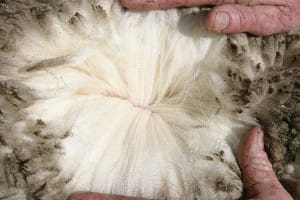The NSW Government’s proposed review of the opportunities and direction of the state’s wool industry has received qualified support from NSW Farmers’ Wool Committee chair Ed Storey.
The review announced today by NSW Minister for Primary Industries, Katrina Hodgkinson, is being called ‘The Future of the NSW Wool Industry by 2025.’
It follows the release of the NSW Liberals and Nationals Government’s Agriculture Industry Action Plan that has been touted as a blueprint for the future of the state’s primary industries sector and providing a strategy to drive growth in the next decade.
“One of the important next steps following the release of the Agriculture Industry Action Plan is the development of strategies for particular sectors, including the wool industry.
“This report will provide the NSW Government with a unique insight into how these changes are impacting on producers and how we can help industry to develop a way forward,” Ms Hodgkinson said.
A review profit focus is supported
Independent consultants have been appointed to work with wool industry leaders to identify the potential opportunities and challenges for the industry. The review will examine several issues including the wool supply chain, production, industry direction and opportunities, challenges and socio-economic factors. It will also examine how the NSW Government could continue to support development and growth of the wool industry.
Mr Storey supported the review focussing on how NSW DPI’s efforts could assist producers to maximise profits.
“It’s not about government getting involved in our farms – we need a lot less of that.
“There is no role for government in directing industry,” he said.
“But if this review is about the department consulting widely throughout the industry to ensure it is in the best place to meet the needs of producers, not directing production … the review will be OK.”
He supported the review examining how the NSW Government could support industry development and growth through research and ensuring DPI programs were beneficial.
“It is up to individual producers in the market place as to how they best want to make a profit off their land.”
NSW flock has dropped by 35pc and clip is finer
Ms Hodgkinson said during the past decade, the NSW sheep flock has dropped by 35 percent, with a similar drop in wool production.
“We have also seen a fining up of the average micron and, since the global financial crisis, this increase in the production of lower-micron wool has placed significant pressure on the economic viability of superfine wool enterprises.
“This report will provide the NSW Government with a unique insight into how these changes are impacting on producers and how we can help industry to develop a way forward.”
Wool production level ‘no concern of government’
But Mr Storey said wool production volumes and micron makeup were “no concern of government”.
He said the NSW DPI had previously espoused the virtues of lowering flock microns to achieve price premiums. Rather than advocating particular production models, the NSW DPI should be “a facilitator of unbiased data”, such as in its current support of wether trials.
“The level of the sheep flock is really of no concern to government and wool production will finds it equilibrium, depending on the vagaries of different markets.
“One thing I hope that I this review does not do is say that it wants to rebuild the NSW flock up by say 20pc or to 40 or 50 million,” Mr Storey said.
“Supply-side economics is not the role of a government department.”
Review aims encompass animal welfare and wild dogs
Ms Hodgkinson said the review would examine:
- how changes in the wool supply chain has impacted industry investment and economic development;
- production issues such as genetics, flock management and animal health;
- a new direction for the wool industry and new partnership opportunities between the NSW Government and industry;
- future opportunities for the wool sector and how, at a farm level, producers can position their business to capitalise on these opportunities;
- how the NSW Government can continue to support the development and growth of the wool industry;
- emerging challenges for the industry such as animal welfare and impacts of wild dogs, and;
- socio-economic factors such as the age of producers, workforce and changing consumer priorities.


Oh hell, not another review to stack on top of the dozens of others over the years, none of which achieved anything. The only ones to benefit will be the independent consultants that have been appointed. As usual. Which brings to memory one of a few years which summarised. Grow more grass, grow more wool. Which was as good as any.